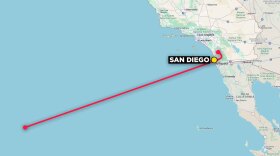Nouri al-Maliki carries the weight of Iraq on his shoulders. In the capital, Baghdad, 100 people are killed in sectarian violence daily. A three-year-old insurgency threatens the stability of his country. And the Bush administration is relying on him to steer Iraq on a smooth course that will enable U.S. troops to be withdrawn.
Al-Maliki was chosen as prime minister last spring in a protracted process that forced every political and religious faction to compromise. He is a Shiite, and a senior member of the influential Shiite party Dawa. Before last May, al-Maliki was unknown outside Iraqi political circles. His most prominent contribution to the postwar reconstruction project was helping to write the interim constitution.
But after Iraqis went to the polls earlier this year to elect their first, fully-democratic government in history, the elected members of Parliament took more than three months to form a government.
Al-Maliki's Dawa party was part of the United Iraqi Alliance which won the plurality of seats in the election. At the time, the alliance selected then-interim prime minister Ibrahim Jaafari to become the next permanent prime minister. But leaders from Sunni and Kurdish opposition parties blocked Jaafari's nomination leading to a government deadlock. Sunni and Kurdish leaders claimed Jaafari wasn't capable of representing all Iraqis because of his longstanding ties with sectarian Shiite groups.
The deadlock paved the way for a compromise candidate, Nouri al-Maliki. Al-Maliki was Jaafari's deputy in the Dawa party but less divisive, and thus, more palatable to other Iraqi parties to lead the government.
In the two months he's led the country, al-Maliki has distinguished himself from his predecessors, at times, even lashing out against U.S. military forces in the country. In June, al-Maliki boosted security in the capital Baghdad by shutting down parts of the city to automobile traffic and setting up armed checkpoints manned by Iraqi soldiers.
The program has had limited success. Terrorism continues to kill and maim hundreds of Iraqis each week and there is no evidence to suggest the bloodletting will soon subside.
Al-Maliki's hope of securing, at the very least, Baghdad, will have received a boost this week. President Bush has promised to commit about 1,000 more U.S. soldiers to help patrol the capital. There are about 30,000 U.S. servicemen and women now stationed in and around Baghdad alone.
Further complicating matters for al-Maliki are the ongoing sectarian divisions that have made it difficult for him to gain the trust of Sunni and Kurdish communities.
Al-Maliki joined the Dawa movement in the 1970s while a student in Baghdad. The Shiite resistance movement was banned by the Baathist regime. Al-Maliki was active in the movement through the decade when his involvement was discovered in 1980. Shortly before he was sentenced to death, al-Maliki managed to escape the country and found exile in Syria.
In Syria, al-Maliki was active in the Iraqi opposition movement, even helping to found the U.S.-backed Iraqi National Congress. Once the Saddam regime fell in April 2003, he returned to Baghdad and became involved in the De-Baathification Commission of the interim Iraqi government. This, too, has made it difficult for al-Maliki to gain the trust of Sunni communities. Many Sunnis viewed the de-Baathification process as a conspiracy by Shiites to dominate the country.
Copyright 2022 NPR. To see more, visit https://www.npr.org. 9(MDAzMjM2NDYzMDEyMzc1Njk5NjAxNzY3OQ001))






